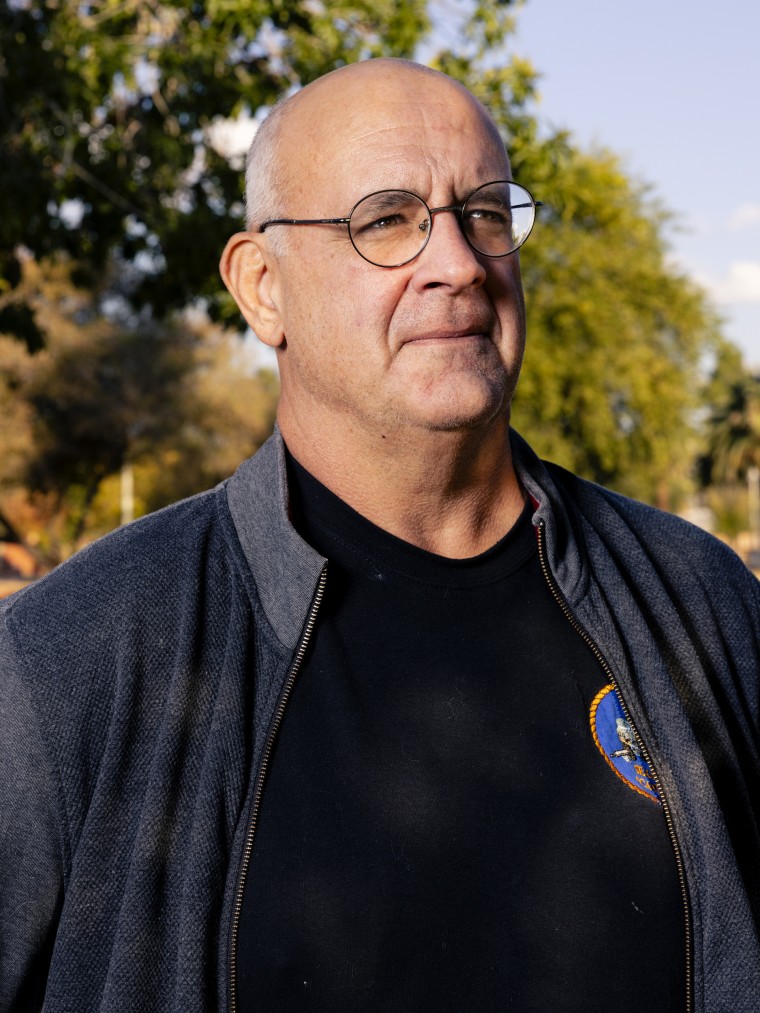[ad_1]
PORTLAND, Ore. — A phalanx of federal officers emerged from the U.S. courthouse in downtown Portland on the night of July 18, 2020 and advanced on protesters standing nearby.
Chris David, from the park across the street, saw the officers plow into the protesters, knocking several of them to the ground. For weeks, nightly racial justice protests in the wake of the death of George Floyd in Minneapolis had roiled the city, and federal officials responded to intermittent violence with an influx of law enforcement.
The Navy veteran had never participated in a protest before, but that night he decided to see for himself after watching with growing unease as the number of federal officers increased at the direction of then-President Donald Trump. David walked up to the line of officers, who were wearing body armor and carrying weapons.
“I stood there and I started asking them the same question over and over again: ‘You are violating your oath to the Constitution. Why are you violating your oath to the Constitution?” David said in an interview.
He never got an answer.
He stood facing four masked and helmeted officers, later identified as deputy U.S. marshals. One officer appeared to push David, who stumbled backward before regaining his balance. At that point, David said one of the officers pointed a firearm at him.
Another officer then hit David repeatedly on his left side with a baton, he said, while another sprayed him in the face with a chemical irritant.
David stumbled away, his hand broken in two places. The video footage quickly went viral.
He subsequently joined a federal lawsuit accusing individual officers of violating his constitutional rights. These are known as “Bivens claims” after a 1971 Supreme Court ruling that allowed such lawsuits.
It was important to him, he said, that the officers be held accountable for their own actions, regardless of what they had been ordered to do. When he studied at the Naval Academy, he added, “one of the first things they taught us is that you are never to follow an illegal order. Ever.”

The explosive protests of that summer are slowly fading into history, but three years later those who were involved are still struggling — both in court and in some instances in their daily lives. David is just one of many protesters who accused federal officers of being overly aggressive, whether it be by striking people with batons, firing nonlethal projectiles or, in more than one instance, allegedly snatching people off the street without explanation.
But not a single federal officer on the Portland streets at that time has been held individually accountable for alleged constitutional violations over claims brought by David and other protesters. In fact, courts have not had a chance to assess whether constitutional violations even occurred.
That is thanks to the intervention of the Supreme Court, which in a series of rulings has created an accountability-free environment in which federal officials interacting with the public on a daily basis, whether it be a bureaucrat sitting behind a desk, a corrections officer in prison or an FBI agent conducting a raid, can violate people’s constitutional rights with impunity.
As NBC News has reported, a 2022 Supreme Court ruling in a case called Egbert v. Boule has had broad repercussions nationwide. At first glance, it concerned only claims against Border Patrol agents, but the impact was far broader.
A Chinese American person could not bring a Bivens claim against FBI agents after being wrongly charged with being a spy. A woman could not sue Social Security Administration officials for incorrectly declaring that she was dead. A Hispanic man could not pursue his claim over his wrongful arrest after U.S. marshals detained him in a case of mistaken identity.
NBC News data shows that, in the 12 months since Egbert was decided, plaintiffs have lost cases against an alphabet soup of federal agencies, including many that have nothing to do with border or immigration issues. In case after case, judges cited the Egbert ruling in refusing to allow Bivens claims.
Cases involving claims made by federal prison inmates have been among those most affected.
Of 228 cases identified by NBC News that cited Egbert in dismissing Bivens claims in the year after the ruling, 142 involved claims by federal prisoners, many of whom did not have legal representation. Prison officials prevailed in 123 of those cases. In one, a female prisoner was barred from pursuing a claim that she was sexually assaulted by a prison officer. Several cases involve claims arising from the treatment of prisoners during the Covid-19 pandemic, including one in which a judge dismissed a claim that an inmate who died from Covid-19 had not received proper medical treatment.
James Pressley, who was formerly incarcerated at a federal prison in Terre Haute, Indiana, and contracted Covid in 2020, joined a lawsuit saying not enough was done to protect inmates, therefore violating his right to adequate medical care under the Constitution’s 8th Amendment, which prohibits cruel and unusual punishment. Pressley was released from prison after his drug-related convictions were thrown out on appeal.
In total, seven inmates died of Covid at the federal prison complex in Terre Haute, which includes two different facilities. The Bivens claims were dismissed in January this year.
[ad_2]
Source link
